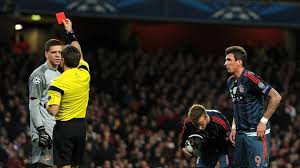By Andrew Warshaw
March 2 – A new FIFA-UEFA spat has emerged, this time over how to resolve the thorny issue of triple punishment – penalty, sending off and suspension – for players who deliberately prevent a goalscoring opportunity.
The contentious item was once again on the agenda of the International FA Board at its annual meeting at the weekend, with a proposal submitted by UEFA for ending years of procrastination over how best to soften what many fans, players and officials believe is far too draconian a sanction.
UEFA had asked IFAB to consider turning red cards into yellows for fouls not deemed to be of a dangerous nature but in a surprising move, IFAB – comprising FIFA and the four British home associations – instead decided to recommend doing away with the automatic one-game ban.
With FIFA holding twice as much power on IFAB as its British members, it would have needed football’s world governing body to support UEFA’s proposal. Instead the yellow card idea was rejected after what was apparently the most heated debate by the law-making body over any single item on the agenda.
Patrick Nelson, chief executive of the Irish Football Association which hosted the IFAB agm, told reporters after the meeting in Belfast: “IFAB agree that this punishment is too harsh and that we must find a solution.
“There was a proposal put forward by UEFA that the referee should issue a yellow card and not a red card and this was rejected by IFAB. But after significant debate IFAB agreed in principle that one of the elements may be removed and this should be automatic suspension for the next game.
“IFAB has tasked FIFA to look at this matter and investigate administratively the removal of the automatic one-match suspension. FIFA will submit proposals for potential changes to the disciplinary code to the March meeting of the executive committee. There is a will to move rapidly on this matter.”
FIFA secretary-general Jerome Valcke said he would try to speed matters up so that the change could take effect from July 1. If it isn’t approved by the exco meeting later this month, it won’t happen for another season.
But no sooner had the IFAB meeting ended than UEFA issued a stern rebuke, suggesting the austere body had completely missed the point even though it is now advised by two new panels of ex-players and officials to make it more democratic.
In a statement UEFA expressed its “extreme disappointment with the decision taken by IFAB to reject our provision regarding ‘triple punishment.”
“The problem with the current law is the mandatory sanction of a red card, which in many cases is too harsh and has a killing effect on the games.
“Therefore, we also fundamentally disagree with the IFAB’s view regarding the one-game suspension, since we feel it totally misses the point.”
Luis Figo, one of the candidates UEFA is believed to be backing to become FIFA president, also said he would have preferred UEFA’s amendment but nevertheless praised IFAB’s willingness to move forward.
“The decision to amend the “triple punishment” is in my Manifesto For Football and is one of the measures I suggest for a long time,” said the Portuguese icon.
“This shows that changing football for the better is not only needed but it’s feasible. The decision taken is a first positive step forward even if it would have been better for the IFAB to address the penalty and red card issue, by foreseeing a yellow instead of a red card in some cases.”
Contact the writer of this story at moc.l1745056645labto1745056645ofdlr1745056645owedi1745056645sni@w1745056645ahsra1745056645w.wer1745056645dna1745056645

